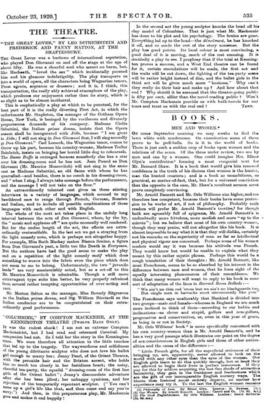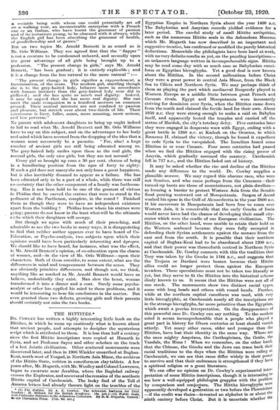BOOKS.
MEN AND WOMEN.*
ON some September morning we may awake to find the lawn white with mushrooms. On examination some of them prove to be puff-balls. So is it in the world of books. There is just such a sudden crop of books upon women and the relations of the sexes. Of the three wider review, two are by men and one by a woman. One could imagine Mrs. Elinor Glyn's contribution, forming a most congenial text for Mr. Bernard Shaw. It ie a book that would give him renewed confidence in the truth of his dictum that woman is the hunter, man the hunted creature ; and is a book so unambitious, so practical, so matter-of-fact, that, but for a universal conviction that the opposite is the case, Mr. Shaw's resultant sermon must prove completely convincing.
Mr. Arnold Bennett and Mr. Orb Williams aim higher, and are therefore less competent, because their books have some preten- sion to be works of art, if not of philosophy. Probably male readers will prefer Mr. Arnold Bennett's treatise,* for though both are agreeably full of epigrams, Mr. Arnold Bennett's is undoubtedly more frivolous, more modish and more "up to the • minute" ; but we believe that most of his own country-women, though they may praise, will not altogether like his book. It is almost impossible to say what it is that they will dislikes, certainly not his remarks on the superiority of man as far as intellectual and physical vigour are concerned. Perhaps some of his women readers would say it was because his attitude was French. They would know but would be unable to explain what they meant by this rather mystic phrase. Perhaps this would be a rough translation of their thoughts : Mr. Arnold Bennett, like most Frenchmen, seems to be so absorbed by his interest in the difference between men and women, that he loses sight of the equally interesting phenomenon of their resemblance. We think that many women will want to reply to his book in some sort of adaptation of the lines in Barrack Room Ballads :- " We ain't no thin rod 'eroes but we ain't no blackguards too, But single men in barracks most uncommonly like you."
The Fret:Amen says unalterably that Mankind is divided into two groups—male and female—whereas in England we are much more inclined to think of them—according to our habits and inclinations—as clever and stupid, golfers and non-golfers, progressives and conservatives, or, even in this year of grace, as being in or not in Society.
Mr. Orb Williams books is more specifically concerned with his own country-women than is Mr. Arnold Bennett's, and he has a very good passage which illustrates our point on the degree of sex-consciousness in English girls and those of other nation- alities and the cause of the difference :— "Little French girls, for all the superficial strictness of their bringing up, are, apparently, never allowed to look on the world with any other eyes than the eyes of the woman. Our English girls learn to do this quickly enough, but at least they are allowed to be their lives in perfect innocence. if they pay for this by seldom acquiring the last fine shade of attractive femininity, they gain in the frankness and fearlessness which are the gift of ow- incomparable English nursery ways. The bloom then fostered never entirely departs, no matter bow experience may try it. To the last the English woman remains (i) Philosophy of Lots._ By Elinor 019o. Loadou 0, Nos_r", 12..1 Brte., bld....:"ar.1.7,.= as. Cd.net.1 a sociable being with whom one could potentially eat off on a walking tour, an inconceivable enterprise with a French one or an Italian, who have learnt the grammar of passion and of its imitations young, to be obsessed with it always, while the English girl has been absorbing the grammar of health, of goodfellowship and of games."
But on two topics Mr. Arnold Bennett is as sound as is Mr. Orb Williams. They are agreed first that the " flapper " is not a creature to be condemned unheard, and secondly upon the great advantage of all girls being brought up to a profession. " The present change in girls," says Mr. Arnold Bennett, " has been gradual ; it is entirely explicable ; and it is a change from the less natural to the more natural " :—
" The present change in girls signifies a rapprochement, S.
fraternisation, of the sexes. The modern girl, startling though she is to the grey-haired lady, behaves more in accordance with human instincts than the grey-haired lady over did in girlhocd and she has quite as much real dignity. Indeed, it may be argued that she has more real dignity. She can meet the male companion in a hundred matters on common ground. Their mutual interests are not confined to passion and pleasure, but stretch over about two-thirds of life. Their intercourse is freer, fuller, saner, more amusing, more serious, and less perverse."
No parent with adolescent daughters to bring up ought indeed to fail to read what Mr. Arnold Bennett and Mr. Olio Williams have to say on this subject, and on the advantages to her body and mind which have accrued from the dropping of the idea that a woman must necessarily be a parasite. "For, alas! a huge number of ancient girls are still being educated among us. The grey-haired lady smiles upon these as the real girls, the normal gide, the only nice girls, but they are not normal."
Every girl so brought up runs a 30 per cent. chance of being in a humiliating position from the ages of forty to eighty. If such a girl does not marry she not onlylosea a great happiness, but is also inevitably doomed to appear as a failure. She has been educated only to be a part of a whole, while there was still no certainty that the other component of a family was forthcom- ing. Has it not been held to be one of the greatest of virtues in Piddles that he carved the statues that were to stand in the pediment of the Parthenon, complete, in the round ? Finished them as though they were to have an independent existence apart from the building ? Phials knew where his statues were going; parents do not know in the least what will be the ultimate niche which their daughters will occupy.
But though we agree with much of their preaching, and admirable as are the two books in many ways, it is disappointing to find that neither author appears ever to have heard of Co- Education, or Psycho-analysis, two subjects upon which their opinions would have been particularly interesting and apropos. We should like to have heard, for instance, what was the effect, in Mr. Arnold Bennett's opinion, of co-education upon the charm of women, and—in the view of Mr. Orlo Williams—upon their characters. Both of them consider, to some extent, what are the differences in mind and temperament between the sexes. They are obviously primitive differences, and though not, we think, anything like as marked as Mr. Arnold Bennett would have us believe, undoubtedly they exist. Man slew the beast, woman transformed it into a dinner and a coat. Surely some psycho. analyst or other has applied his mind to these problems, and it would be interesting to hear his conclusions in the matter. But even granted these two defects, growing girls and their parents should certainly not miss the two books.



































 Previous page
Previous page